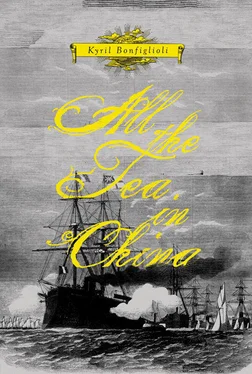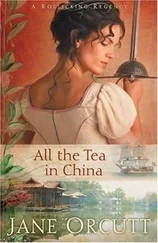“Werry early,” agreed Mr J, pulling out a gold half-hunter.
“But …?” I said, fumbling in my waistcoat but not pulling out my gun-metal “turnip” watch.
The mutton chops were very good, although the boiled potatoes and cabbage were not: the British do strange and disgusting things to their vegetables. We all fortified ourselves heroically. Our little dinner was only marred when a barrel-organ outside struck up the popular air “If I Had a Donkey Vot Vouldn’t Go”. Mr Jorrocks rose to his feet, tore off his wig and dashed it to the floor.
“By all that’s impure!” he bellowed, “shall I never be free of the warmint? I swears he follows me all over London! Waiter, waiter I say, take this penny and implore that pernicious dinner-spoiler to move into the next street before I does him a mischief.”
“You are not, then, fond of music, Mr J.?” I asked carefully, when the music had stopped.
“Knows only two tunes,” he grunted. “One of them is ‘God Save The King’ and the other — hisn’t.”
We called for more chops, again and again; my Mama would have been proud of me. Then we went into the reading-room to snooze a little. (I should explain that in England you sleep in the reading-room, just as you eat in the coffee-room, smoke in the study, spend the afternoon in the morning-room, drink tea in the drawing-room and, unless you happen to be in love with your wife, sleep in the dressing-room whilst your wife, quite likely, is committing adultery in her sewing-room. It is all very strange. There is now a book called Alice in Wonderland which explains how the English system works, although in veiled language.)
This snoozing of mine was not long, for my friends snored like Dutchmen. I crept out without awakening them, paid the bill and took a cab to the dealers’ part of London which in those days was a few mean streets to the South of Piccadilly Road, near the Palace of St James’s. I sauntered about, for I was in my fine new coat, a coat in which one could saunter with confidence, looking carefully at things in windows and even more carefully at their prices. Whilst I was looking carefully into such a window, of a shop kept by someone of a Jewish name and no ignorance, the proprietor opened the door of the back room and came into the shop. While that door was briefly open I had a brief vision, in the back room, of what seemed to be an incomparable set of five “Lange Lyzen” vases, quite beautiful. Although the dealer was, from his goods and their prices, not a man of ignorance, I felt drawn into his shop as though by invisible cords. We looked at each other, then nodded perfunctorily as people of our religion do when we meet each other but not in the bosom of our families.
I browsed around the shop, looking at this and that, while he pottered in and out, he knew I would not steal anything. I chaffered for, and bought, a fine eggshell cup and saucer of the real Imperial Yellow; also a good rice-bowl with the “leaping boy” decoration. They were not too dear, for it was a slack season; also, he was overstocked (which is the besetting vice of us Jews) and, at that time of the afternoon, neither of us was in the mood for protracted bargaining: we both knew what I would pay and we did not care to go through the usual long agony — or ecstasy — of reaching that figure.
As I was leaving I said “Ah, by the way …”
He did not say “Oy veh !” and he only sketched out the gesture of slapping the palms of his hands to the forehead. What he said was: “So. A ‘by-the-way’ asker, already. You have perhaps an expensive mistake you wish to pass on to a fellow-dealer? Or you have heard of my beautiful daughter with the large dowry?”
“Neither of those,” I said politely; “I just wished to say that I might be interested to buy a set of good Lange Lyzen if the price were right.” He shuffled his feet, avoiding my gaze. “Only the ones in the window,” he said at last.
“They are pretty,” I said politely, “but they are not quite as good as I require; moreover, they are but three and I wish for a full set of five, such as those I chanced to notice in your back room when you opened the door.”
“Not for sale,” he said gruffly.
“A pity. But perhaps, all the same, I might be permitted to look?” He hesitated, then agreed. “But you will promise to keep your mouth shut, eh?”
I promised, thinking that perhaps the person he had bought them from might not have been quite entitled to sell them. He read my thoughts.
“They are honestly come by,” he growled. “If you are as clever as you think you may be able to guess why I cannot sell them.”
The more I looked at the beautiful vases — the finest I had ever seen — the more puzzled I became. They bore a fine set of six-character marks and there was no visible flaw. When I made as though to pick up the last one the old dealer lifted an admonitory finger.
“Look only,” he said; “don’t lift.” I thought about that, then lifted up one of the others, looked at the bottom again, felt it. The glaze there was very odd to the touch. I took it to the light: there was no doubt, it was not glaze but a clear varnish over white paint on which the marks had been forged. But why? It was baffling, for the pots themselves were as genuine as golden sovereigns.
“Forged marks on genuine vases,” I said to the shopkeeper. “What was the need? And why does this prevent you from selling them? You have but to scrape off the paint.”
He laughed bitterly.
“I scraped; oy, I scraped. See.” He handed me the fifth pot. He had indeed scraped to good purpose: half-revealed on the bottom was a beautiful, delicate, detailed painting under the glaze. It depicted five most gifted Chinese persons engaged in a complicated act of quite unbelievable indecency; I found it entrancing: my face and neck became hot. He took the vase out of my hands.
“Don’t enjoy!” he said sternly. “Two hundred pounds I gave for these paskudnyaks — you are a mavin , you know that was a metsieh but not robbery — and now I dare not show them at all. Even if the police did not send me to prison, who would buy? Collectors of porcelain are respectable people, ladies and gentlemen; noblemen some of them.”
“Yes,” I said reflectively. “How much of a loss would you take? I think I know a meshuggener who might take them.”
“Loss?” he asked suspiciously, “loss? Who’s talking of loss? Maybe only a small trifle of a profit …”
We settled down to haggle in earnest. He was an old man much frightened of the authorities, for in those unenlightened days our race was much persecuted; every time I slipped the word “prison” into my talk he covered his eyes and said either “Zeeser Gottenyu!” or “ Gevald !”
It was half an hour before I saw that his price was hardening at one hundred and ten guineas. I trimmed the shillings off and paid one hundred and ten pounds, leaving him keening at the loss but, clearly, relieved to be rid of the dangerous vases.
I told my cabbie to take me home via Eaton Square, where I left a note for Lord Windermere, urging him to call on me as soon as might be, lest he miss an incomparable purchase.
At the shop, the boy “You” told me that he had sold his first pot, for five-and-seventy shillings. He was very proud. Also, his new suit of “duds” had arrived and he asked me shyly whether he might put them on and go to the Foundling Hospital to visit his little mates there, for it was the first Friday of the month, when such visits are permitted to the little “come-by-chance” inmates. I agreed.
“But first,” I told him, “you are to climb onto the roof and break off a little piece of lead, about so big, for I wish to scrape a bottom.” He sped off on this mission without question, for he had long ago decided that I was insane.
Читать дальше












